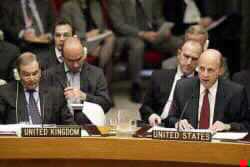France appeared favorably disposed to new U.S. proposals for a draft resolution that now drop any immediate authorization for a military strike against Iraq unless Baghdad balks at U.N. weapons inspections, diplomats said late on Thursday. An agreement with France, which was leading widespread resistance to an early U.S. draft, would clear the way for approval by the 15-nation Security Council, possibly before the end of the month.
The United States hopes to circulate its full text to key members of the council by Friday or early next week.
"So far the U.S. changes are acceptable to France," said one diplomat. But he said negotiations between Paris and Washington were still taking place.
Facing major opposition from nations around the world, the United States radically changed key parts of its earlier draft resolution which authorized any U.N. member to "use all necessary means" if it decided Iraq violated a whole series of infractions. The new text also deletes earlier proposals explicitly threatening "serious consequences."
Nevertheless, Secretary of State Colin Powell said that a new resolution would not prevent Washington from undertaking a military strike against Iraq.
"The United States does not need any additional authority even now, if we thought it was necessary to take action to defend ourselves," he said after meeting chief U.N. arms inspector Hans Blix.
The new U.S. measure directs Blix "to report immediately to the council any failure by Iraq to comply with its disarmament obligations," according to excerpts obtained by Reuters.
Council members would then meet "to consider the situation and the need for full compliance with all of the relevant Security Council resolutions."
This could mean a second resolution. But if the council does not then authorize force, the United States could decide to strike Iraq anyway, and would probably get considerable support to do so, the envoys said.
Speaking later at a New York awards dinner, Powell said: "We need a tough new resolution that will send inspectors back in with the authority to do their job and disarm Iraq."
"This time Iraq must face consequences for continued failure to disarm," he told the Alfred E. Smith Memorial Foundation Dinner. "If the United Nations does not act, the United States joined by other nations, willing nations, must act and will act."
France, backed by Russia and China, who have veto power in the council, had wanted two resolutions, one which would give Iraq an opportunity to comply and a second that would authorize force. The new U.S. compromise has been labeled as a "one-and-a-half step."
The U.S. proposals would still include the term "material breach" that the White House could interpret as allowing military action, as NATO did when it struck Yugoslav forces in Kosovo in 1999. But its placement in the text would no longer be linked to military action as in the original draft.
French Ambassador Jean-David Levitte told an open debate in the council, that his country insisted on a "two-staged" approach but did not say if this meant a second resolution.
But he warned that "given the gravity of the situation, in which nothing less than peace or war is at stake, it is essential for the Security Council to remain in charge of the process every step of the way."
CONCILIATORY STATEMENTS
Russia's Foreign Minister Igor Ivanov made conciliatory statements in Moscow after talking to Powell, saying he opposed an "automatic" use of force but "hoped that by joining forces we will be able keep the settlement of this situation within a political framework."
But his U.N. ambassador, Sergei Lavrov, sharply criticized any unilateral action and warned the United States not to use the Security Council as an excuse for a military strike or one that would lead to a "regime change."
British Ambassador Sir Jeremy Greenstock, whose country supported all the U.S drafts, said London wanted a "detailed Security Council discussion" if the U.N. inspectors reported Iraq did not fully cooperate with them.
The Bush administration also appeared willing to drop provisions in its original draft that would allow key council members to join U.N. inspections and have troops open any routes that may be barred to the arms experts.
Both demands are opposed by Blix as well as most Security Council members.
PHOTO CAPTION
U.S. Ambassador to the United Nations John Negroponte (R) addresses a Security Council meeting on the situation in Iraq at the U.N. October 17, 2002, as British Ambassador Jeremy Greenstock (L) listens. The United States pledged to introduce shortly a new U.N. resolution, which diplomats said offered compromises that could delay any U.S.-led attack against Iraq. (Ray Stubblebine/Reuters)
- Author:
& News Agencies - Section:
WORLD HEADLINES


 Home
Home Discover Islam
Discover Islam Quran Recitations
Quran Recitations Lectures
Lectures
 Fatwa
Fatwa Articles
Articles Fiqh
Fiqh E-Books
E-Books Boys & Girls
Boys & Girls  Hajj Rulings
Hajj Rulings Hajj Fatwas
Hajj Fatwas














